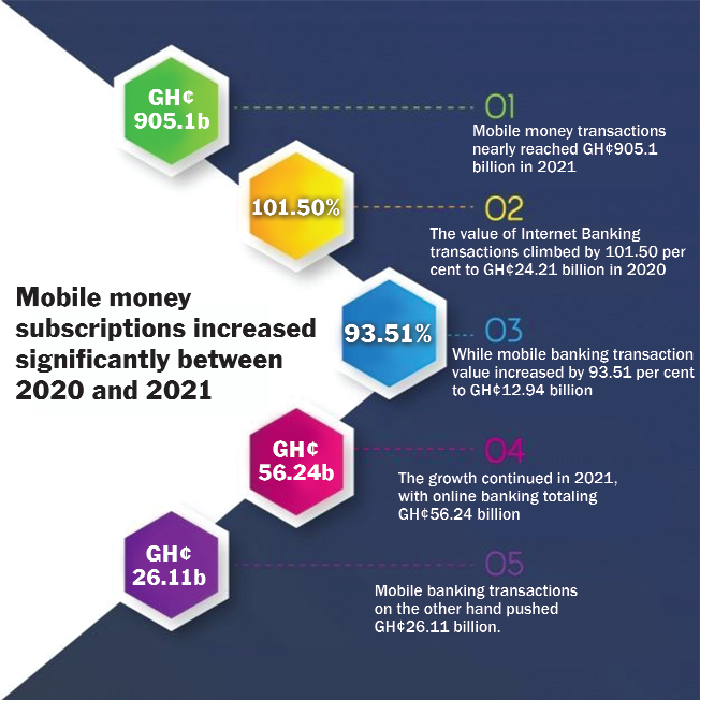
Crisis as catalyst: How pandemic is paving way for accessible financial techs in Ghana
THE COVID-19 pandemic has undoubtedly had an imprint on every part of our life. Globally, its negative impact was felt when the International Monetary Fund (2021) recorded a 3.2 per cent contraction of the world economy. The stock markets also plummeted as the New York Stock Exchange paused trading on many occasions at the height of the pandemic.
In the area of trade, the lockdowns and border closures caused global trade to contract by some 8.3 per cent. And even as we dust ourselves from the worst of the pandemic, economies continue to grapple with its long-term impact.
But amidst all the economic challenges, digital technologies provided a lifeline for businesses to function and for money to flow, especially when movements were restricted. According to the World Bank Group, about 800 million individuals went online for the first time in 2020 while digital payment systems were adopted as the conduit to deliver aid in most low to middle-income countries.
A surge in digital financial technologies in Ghana
In Ghana, the Ghana Statistical Service (GSS) reported in a 2020 study that more than one-third of the 4311 enterprises surveyed had expanded their usage of mobile money, while one-tenth had begun or increased their use of the internet to conduct business.
As a result, financial institutions have adapted to the new standard, innovated and teamed with Financial Technology Firms (FinTech) to provide a variety of digital financial services. For example, in 2020, the Bank of Ghana (BoG) approved 32 new products and services for various financial institutions to provide a range of digital financial services. Some banks also developed WhatsApp and Chat banking to provide financial services to customers remotely, while others introduced remote account-opening systems that allowed individuals to open bank accounts directly from their cell phones using bank apps and USSD codes.
Roping in unbanked, underbanked
This large-scale digital transformation has inevitably had a far-reaching impact on financial service access and service delivery. Among these critical outcomes is that banks have been able to service the financial needs of hard-to-reach customers, i.e. the unbanked and underbanked – largely found in the informal sector and rural communities.
Again, several SMEs and local businesses were able to access funding via mobile payments under the government’s CAP-Buss initiative and have gone on to use digital platforms for their business transactions.
According to data by the Central Bank, for instance, mobile money subscriptions increased significantly between 2020 and 2021, and mobile money transactions nearly reached GH¢905.1 billion in 2021. The value of Internet Banking transactions climbed by 101.50 per cent to GH¢24.21 billion in 2020, while Mobile Banking transaction value increased by 93.51 per cent to GH¢12.94 billion. The growth continued in 2021, with online banking totalling GH¢56.24 billion and mobile banking transactions pushing GH¢26.11 billion.
Technologies, investments to support digital transformation
In May 2020, the bank made institutional adjustments in response to the increasing and dynamic nature of the Fintech business by establishing a Fintech and Innovation Office. This partnership established a specialised office to manage all Fintech-related activities and to test new and emerging payment technologies that required regulatory oversight.
While policies and regulatory efforts are being enhanced to support the transformation, there’s also a massive push for investments into the digital space to support the innovations.
In this light, the Ghana Investment Promotion Centre (GIPC) has spearheaded investment missions and engagements to court and attract worthwhile investments into key sectors and particularly ICT. Among these are engagements with silicon valley tech companies such as Overland Tandberg in a recent mission to the united states of America (USA). Even more recently was the engagement with the Chairman of the DAMAC group to facilitate investments into various industries, including Technology in Ghana.
According to the CEO of the GIPC, Yofi Grant, “Digital innovations in all forms and notably the financial services sector will continue to fill an important role in the country’s economy going forward. It is, therefore, expedient that we seek partnerships and linkages between our local techpreneurs and blue-chip companies/ Tech Giants to help accelerate, strengthen and sustain our digital transformation.”
The writer is an investment promotion officer, GIPC.